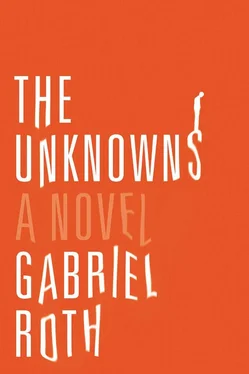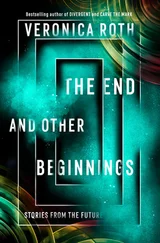Otherwise you’ll find that your hacking energy is sapped by distractions like sex, money, and social approval.
— Eric S. Raymond, “How to Become a Hacker”
THE GROTSCH BUILDING LOOMS over the Mission like a relic of a previous civilization: once a pickle factory, now a square stone memento of a time when San Francisco hosted economic activity beyond symbol manipulation and beverage service. The city’s current inhabitants, with their gift for cheerful irony, rent it out for photo shoots and weddings. This month the Grotsch has been hired by a gang of planners and architects and urbanism geeks, grad-school friends of Justin’s, to host an exhibition called BayTopia. Cynthia has persuaded me to accompany her to the opening. The volume of space above us makes the conversations sound farther away than they are, and the air has the seedy smell of wet coats. We will find Maya here, supposedly.
In the middle of the floor is a scale model of the peninsula, with crude cardboard buildings on carefully modeled topography. Fantastic elements are painted bright colors: elevated bike paths that stretch around the neighborhoods, public parks and pools on the roofs of high-rises. On the walls are maps displaying census data in colorful and supposedly revelatory ways, but the daylight from the high windows doesn’t quite illuminate them properly. Justin is talking to a pale man who seems to be explaining something very intensely. Many of the men here have a Nordic aspect, and the women are disproportionately short. And there’s Maya, off to the side, talking to a tall girl in a puffy jacket. Although my instinct is to hide from her, I make myself catch her eye and stage a moment of recognition, raising my chin in the universal sign for What’s up ? At first she’s not sure who I am. Then she smiles back, casually but still enough to make me worry I’m going to explode.
“Don’t turn around,” I say to Cynthia. “Now: I need you to talk to me for the next five or ten minutes.”
“I really want to see her,” Cynthia says. “I’ve forgotten what she looks like.”
“In a minute. Just chat with me in a friendly but not flirty way.”
“I feel like a spy,” she says. “OK, chatting, chatting. Spy in the house of love. What’s that from? Hey, I should go say hi to Justin.”
“That presents me with a problem,” I say. “If we go say hi to him together then we’ve become a couple, doing things in unison. But if you go say hi and I don’t, then I’m standing awkwardly on my own.”
“I’m really seeing you in action,” she says.
“OK, OK, let’s go talk to Justin.” I glance over at Maya, which is an error, but she doesn’t notice.
Cynthia pulls Justin away from his companion and hugs him. I hover while they catch up, trying to look like I’m part of the conversation. Eventually he turns to me. “How’s it going, Eric?” he says.
“Not much,” I say. I always get the easy ones wrong.
“Cool, man, cool,” he says. “There’s some wine and stuff over there.”
And so I set out toward the buffet table, a journey that takes me directly into Maya’s line of vision. The floor is shiny cement, very hard, not comfortable to walk or stand on for long. Overriding my inclinations I look straight at Maya and smile in the hope of projecting the exact opposite of what I’m feeling. People say It’s all about self-confidence , but they don’t say why, and so for a long time I rejected this truism. Why should self-confidence, of all qualities, be the key to attractiveness? The answer is that sexual selection is distorted by information asymmetry. The first time she sees you, she doesn’t know if you’re a potent, generous alpha male or a guy who spends all day getting into edit wars on Wikipedia. But you know, and the self-valuation you display is her best clue. But knowing that confidence is valuable doesn’t help you acquire it — it just pushes your confidence toward the closest extreme. Confident people know they have an advantage and become more confident; insecure people know they have a handicap and become less confident. It’s a virtuous or vicious cycle, depending on which side of the zero intercept you start from. I’ve arrived at her conversation, and she turns to look at me with that amazing unsurprisable expression, and again I’m sure she knows everything there is to know about me.
“What’s up?” she says. “Eric, right?” The fact that she remembers my name must be a good sign, unless she remembers it from talking to Lauren on the phone the day after I met her. I love you, Mom . Jesus.
“Yeah, Eric,” I say. “And you’re Maya.” It comes out as a statement of fact.
“How’s it going?” she says. “This is the lovely Rebecca Grady.” The lovely Rebecca Grady smiles sardonically at Maya and makes a curtseying gesture. She is in fact not unlovely; she looks a lot like the actress Helen Hunt, who is of only average loveliness for a TV actress but certainly 98th-percentile by civilian standards. It’s a shame for Rebecca Grady that Helen Hunt became recognizable, because now instead of her beauty what you see is her resemblance to Helen Hunt. We stand there for a minute in this awkward triad. I don’t have any Maya-specific conversational hooks, so I ask how her weekend is going.
“I’ve been chained to my desk,” she says. “This is the first time I’ve left the office since Wednesday.”
OK, we’re going to start with a work conversation. “What do you do?” I say, shifting my feet slightly so I’m facing Maya foursquare instead of splitting my focus between the two of them. It’s a little rude to Rebecca Grady, but it has the advantage of diminishing the chances that I’ll end up going home with her and making ill-advised confessions.
“I’m a reporter,” Maya says. She names one of the local alternative weekly newspapers: left-wing politics in the front, phone sex ads in the back, record reviews in the middle. A month ago, feeling rich and lonely, I called one of the phone sex numbers and made it as far as entering my credit card number, although as soon as the person answered I got embarrassed and hung up.
“So what’s the story that’s kept you chained to your desk?” I ask.
“Big dull investigation,” she says. “Frisco Tow, the company that tows your car when you park in a bus stop. Graft, corruption, the usual.”
“You’re a muckraker. You rake the muck.”
“I do. I’ve been raking muck for three weeks straight. It gets kind of messy. How about you? You do some kind of Internet thing, right?”
Christ, how does she know? “Yeah, I make software,” I say, because I’ve tried all the synonyms and that one is the least bad. “So how did you get started with the raking of the muck? Were you a freelancer?” The fact that she has made no move to include Rebecca Grady in the back-and-forth qualifies as a good sign.
“No, I got hired right out of college as an assistant administrative assistant,” she says. “There’s a lot of turnover. Did you study, like, computer science?”
“No, I, uh, I didn’t go to college,” I say. “I learned on my own, basically.” This information can be presented as a badge of shame or a badge of pride, depending on nuances of tone, expression, and gesture. Shame is never attractive, and pride raises the possibility that I don’t know anything about anything except computers, so I aim for neutrality, although this risks sounding defensive.
“Did you not want to go, or you couldn’t afford it, or what?” she says. I have told maybe one hundred people that I didn’t go to college, and they were all wondering the same thing, but she’s the first to come out and ask.
“I really wanted to go,” I say. “It’s a — well, it’s a medium-length story.”
Читать дальше












